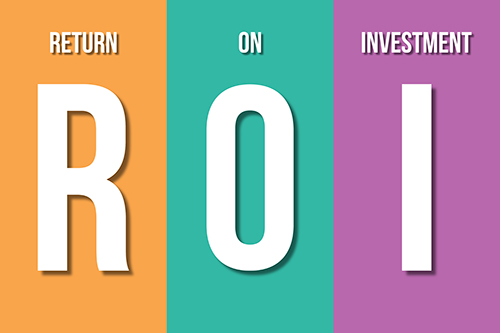Learn
Stocks and Investments
Why Invest?
In order to let your money grow, you need to invest it wisely.
The decision about which investment to choose is influenced by factors such as:
- risk,
- liquidity, and
- yield (the rate of return earned by the investment, usually stated as a %)
How do People Make Money by Investing?
Investments may produce income through the payment of interest, dividends, or rent payments.
Dividends are a distribution of a company's profits.
When you sell an investment for more than its purchase price, the profit is called capital gain, and you'll pay some income tax on that gain.
On the other hand, if you sell an investment for less than its purchase price, you can usually deduct the loss.
To figure out how much you have gotten in yield or “return” on investment, use ROI or return on investment.
Return on Investment
The return on investment formula allows you to compare returns on different types if investments. It gives you a percentage return. This allows you to easily compare investments.
The formula for ROI is:
ROI = (Current Value of Investment − Cost of Investment)/Cost of Investment
ROI example
For example, Anna invests $5,000 in a mutual fund at the beginning of the year. At the end of the year, the value of her mutual fund is $5,897. Her return on investment is calculated as follows:
(5,897-5,000)/5,000 = .1794 or 17.94%

Types of Investments
The following investments can be used for long-term investing:
- Stocks
- Corporate and municipal bonds
- Mutual funds
- Real estate
- Collectibles
- Future contracts
Let's look at each one in more detail.
Stocks
Investors who own stock in a corporation are stockholders. Corporations raise money by selling ownership in their organization. The risks involved in investing in the stock market are twofold:
- The company whose stock you purchase is under no obligation to buy back the stock when you wish to sell. In fact, when you sell stock, it is sold to another investor. If the value of the stock is decreasing, you might have to sell at a loss.
- The corporation is under no legal obligation to pay dividends to stockholders. If the company makes a profit, the board of directors may vote to share that profit with stockholders. However, they may choose to reinvest the money in the company.
Types of Stocks - Common Stock
The two basic types of stock are common stock and preferred stock.
Common stockholders have voting rights. They get one vote for each share of stock owned. There is also typically a good potential for growth in the value of common stock. On the negative side, if the company does not make a profit, the company will likely not distribute any dividends to common stockholders.
Types of Stocks - Preferred Stock
Preferred stock is stock that gives the owner the advantage of receiving cash dividends before common stockholders. The amount of the dividend paid to preferred stockholders is known at the time of purchase of the stock. It is either a stated amount per share of stock, or a percentage of the value of the stock.
If a company declares bankruptcy, preferred stockholders have the right to receive any assets that are left before common stockholders receive anything.
However, preferred stockholders do not have as much voting power. Preferred stock is also less likely to grow in value quickly.
Bonds
Ownership of a bond means you have loaned money to a company or governmental unit. In return, the company or municipality promises to repay the amount borrowed plus interest.
There are two types of bonds:
- corporate bonds – issued by a company
- municipal bonds – issued by a municipality
Mutual Funds
A mutual fund invests pooled money of its shareholders in various types of investments.
The fund manager buys and sells securities for the fund's shareholders.
Mutual funds are not risk free. Their values rise and fall along with the securities in the fund.

Benefits of Mutual Funds
Benefits of mutual funds for beginning investors include the following aspects:
- Diversification
- Professional management
- Relatively low-cost shares
- Liquidity and convenience (easy to buy and sell shares)
More than 9,000 different mutual funds are available. They all have annual management fees. Some have buyer/seller fees.
Real Estate
Home ownership is an investment. Homes can appreciate in value or drop in value.
Unlike stocks, bonds, and mutual funds, property is something you can see and touch - it has a more emotional value. It is part of the "American Dream."
Other real estate investments could include apartment complexes, business property, and undeveloped land.

Collectibles
Antiques, stamps, precious metals and gems don't pay interest or dividends but can increase in value over time. The rewards or losses of owning collectibles can be great. Financial advisors caution against placing too much of your investment in collectibles for a variety of reasons:
- There is no regulated marketplace
- Not liquid
- Information regarding prices is almost nonexistent
- Fraud is rampant in the collectibles market

Features Contracts
A commodity is a raw material or agricultural product that can be bought and sold.
A commitment to buy or sell a specific amount of a commodity (wheat, coffee, pork, corn) at a specific future date and price is a futures contract. Futures are extremely high risk. Futures should never be more than a small portion your total investments.

Investment Decisions
In order to increase your financial security, and to provide for your future, you will probably want to invest your savings at some point in time.
Where you choose to invest will be a decision you will need to make based on your personal wants, needs, goals, and values.
By increasing your knowledge of investment options, you will be able to make the choice that is best suited for you.
On the following slide, study the pyramid of investment. It classifies investments by their risk.
Pyramid of Investment

Researching Investments
It is important to take time to research your investments option thoroughly before purchasing them.
If you are researching stocks or any other securities, you can use the internet to look up the stock you are thinking about purchasing. You can use websites such as Yahoo Finance or Google Finance to find any stock that is available for the public to purchase.
If you choose to invest in real estate, it is important to research the market you plan to invest in as well as consult with a licensed real estate agent.